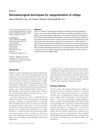 4 citations,
January 2015 in “Türk Patoloji Dergisi”
4 citations,
January 2015 in “Türk Patoloji Dergisi” Hormone imbalances from endocrine diseases can cause various skin conditions that help diagnose and treat these diseases early.
 March 2021 in “Indian Journal of Case Reports”
March 2021 in “Indian Journal of Case Reports” A young woman with late-stage Vogt-Koyanagi-Harada disease was successfully treated at a hospital.
 August 2023 in “Dermatology and Therapy”
August 2023 in “Dermatology and Therapy” Imiquimod can cause rare skin side effects, some irreversible, and long-term follow-up is important for users.
 24 citations,
October 2014 in “Cold Spring Harbor Perspectives in Medicine”
24 citations,
October 2014 in “Cold Spring Harbor Perspectives in Medicine” Genetic research has advanced our understanding of skin diseases, but complex conditions require an integrative approach for deeper insight.
 May 2022 in “Rossijskij žurnal kožnyh i veneričeskih boleznej”
May 2022 in “Rossijskij žurnal kožnyh i veneričeskih boleznej” Alopecia areata is complex, often recurring, and needs personalized treatment, especially with other health issues.
 16 citations,
January 2006 in “The Aging Male”
16 citations,
January 2006 in “The Aging Male” Hormone imbalances can cause skin diseases, and understanding these links is important for diagnosis and treatment.
 11 citations,
July 2014 in “American Journal of Clinical Dermatology”
11 citations,
July 2014 in “American Journal of Clinical Dermatology” People with vitiligo may have a higher rate of Helicobacter pylori infection, but the infection's severity doesn't affect how severe the vitiligo is.
 60 citations,
April 2006 in “International Journal of Dermatology”
60 citations,
April 2006 in “International Journal of Dermatology” Surgical methods like suction blister grafting and split-thickness skin grafting are highly successful for vitiligo repigmentation, but choosing the right patients is crucial for success.
 2 citations,
October 2016
2 citations,
October 2016 Chemotherapy and radiotherapy can cause skin side effects like rashes, hair loss, and nail changes, which are usually managed with conservative treatments.
 March 2018 in “John Wiley & Sons, Ltd eBooks”
March 2018 in “John Wiley & Sons, Ltd eBooks” Surgical therapies for vitiligo vary in effectiveness, with combination therapy and medical tattooing recommended for better results.
January 2019 in “Springer eBooks” Combination therapies might work better for some vitiligo patients, but results vary.
 9 citations,
April 1976 in “Archives of Dermatology”
9 citations,
April 1976 in “Archives of Dermatology” Iodides can cause skin issues like acne and other health problems.
 16 citations,
May 2017 in “American Journal of Clinical Dermatology”
16 citations,
May 2017 in “American Journal of Clinical Dermatology” The document concludes that more research is needed to understand and treat Beard Alopecia Areata due to limited current knowledge and evidence.
 July 2004 in “Clinics in Dermatology”
July 2004 in “Clinics in Dermatology” The Third World Congress of the International Academy of Cosmetic Dermatology discussed various topics like hair disorders, skin conditions, wound healing, shampoo technology, acne treatment, and the use of lasers in dermatology.
2 citations,
May 2020 in “JAAD case reports” Ruxolitinib can cause a delayed skin reaction on the nose.
 November 2023 in “Indian Dermatology Online Journal”
November 2023 in “Indian Dermatology Online Journal” Tofacitinib was effective for severe, treatment-resistant hair loss without side effects.
 24 citations,
January 2008 in “KARGER eBooks”
24 citations,
January 2008 in “KARGER eBooks” The document concludes that ongoing research using animal models is crucial for better understanding and treating Alopecia Areata.
 62 citations,
March 2012 in “Journal of the European Academy of Dermatology and Venereology”
62 citations,
March 2012 in “Journal of the European Academy of Dermatology and Venereology” Using dermoscopy to guide scalp biopsies is an effective way to diagnose cicatricial alopecia.
 17 citations,
January 2011 in “The Korean Journal of Hepatology”
17 citations,
January 2011 in “The Korean Journal of Hepatology” Vogt-Koyanagi-Harada disease can develop during interferon therapy for chronic hepatitis C.
 56 citations,
January 2021 in “Clinical and Experimental Medicine”
56 citations,
January 2021 in “Clinical and Experimental Medicine” The document concludes that while there are various treatments for Alopecia Areata, there is no cure, and individualized treatment plans are essential due to varying effectiveness.
 15 citations,
March 2021 in “Journal of clinical medicine”
15 citations,
March 2021 in “Journal of clinical medicine” Biologic treatments for Crohn's disease and ulcerative colitis can cause skin problems, and doctors should adjust treatment if these occur.
 6 citations,
December 2011 in “Clinical and Experimental Dermatology”
6 citations,
December 2011 in “Clinical and Experimental Dermatology” A woman developed rare, unexplained curly hair on her scalp and eyelashes.
1 citations,
January 2018 in “Springer eBooks” The book helps doctors understand and treat alopecia areata.
 15 citations,
January 2020 in “Experimental Dermatology”
15 citations,
January 2020 in “Experimental Dermatology” The document concludes that understanding and treatments for alopecia areata have significantly advanced, now recognizing it as an autoimmune disorder.

The patient with total hair loss did not regrow hair despite treatment, indicating a poor outlook for this type of hair loss.
 January 2009 in “Springer eBooks”
January 2009 in “Springer eBooks” The document concludes that treating skin conditions should include psychological care and a multidisciplinary approach is essential for effective management.
 January 2016 in “Skin appendage disorders”
January 2016 in “Skin appendage disorders” The document discusses various nail and hair disorders and their treatments.
 17 citations,
January 2021 in “Dermatology and Therapy”
17 citations,
January 2021 in “Dermatology and Therapy” Laser-assisted drug delivery has shown improved treatment outcomes for skin conditions and has potential to reduce side effects and treatment time.
 108 citations,
August 2017 in “Clinical, Cosmetic and Investigational Dermatology”
108 citations,
August 2017 in “Clinical, Cosmetic and Investigational Dermatology” Microneedling is promising for treating various skin issues but needs more research to confirm its effectiveness and safety.
 January 2015 in “British journal of medicine and medical research”
January 2015 in “British journal of medicine and medical research” A woman with severe hair loss due to systemic sclerosis regrew her hair in 4 months using a combination of treatments.



























